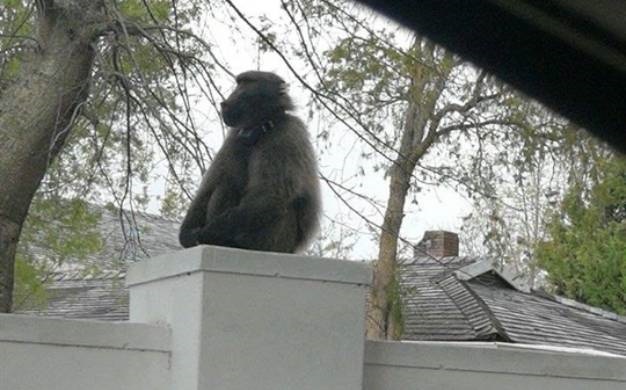


Kataza the baboon.
Facebook / Baboon Matters
- The City of Cape Town has asked the public not to feed a baboon that has relocated to Tokai.
- The baboon, known as Kataza or SK11, is slowly being integrated into the Tokai troop.
- Video footage, however, shows humans feeding Kataza.
The City of Cape Town has requested that Kataza the baboon – who has relocated to Tokai – be left alone, not be harassed and under no circumstances, be fed.
The baboon, also known as SK11, who was relocated from Kommetjie, spent most of its time with the Tokai troop over the weekend and even slept near the Tokai SANParks offices, said Cape Town mayoral committee member for spatial planning and environment, Marian Nieuwoudt.
READ | Cape Town residents outraged by disappearance of baboon, Kataza
The baboon is collared and is being monitored from afar in accordance with accepted protocols, Nieuwoudt added.
According to the latest update, SK11 is in Tokai, behaving like a dispersing adult male baboon and it appears that it is slowly integrating into the Tokai troop.
On 22 September, SK11 was examined by a veterinarian and behavioural ecologist specialising in primates, who reported that it was in a good condition and had a shiny unmatted coat. In the mornings, it usually follows the Tokai troop to where they forage, keeping on the edge, while observing the troop and making friendly signs, such as lip smacking and pulling its ears back.
After a while, curious young baboons approach him with similar friendly lip smacking and greetings. This is normal behaviour for a male baboon joining a troop. Being accepted can take weeks to months and it is best for SK11 to be left alone and not to be followed by humans, Nieuwoudt said.
Kommetjie residents have expressed their relief to hear that a local baboon, SK11 or Kataza as he is affectionately known, has had his life spared.https://t.co/YrRt8dPdio
— News24 (@News24) August 15, 2020
Nieuwoudt said SK11 needs to interact with other baboons in its own time. She said it was important because the current service provider, HWS, was trying to keep him out of the urban area so that it was safe and did not raid.
However, she said the baboon was being harassed by interfering individuals.
Over the weekend, video footage showed people feeding him.
Don’t feed the baboon
“Feeding a wild animal is not only illegal, but detrimental as human-derived food is unhealthy for baboons and will result in an increase in raiding behaviour. As such, we have asked CapeNature to examine the video footage for possible legal action,” said Nieuwoudt.
“The City of Cape Town strongly requests that SK11 be left alone, not be harassed and under no circumstances be fed.”
Residents in the vicinity of Tokai Park are advised to follow the guidelines below, should SK11 enter their property:
- lock all doors and secure all windows;
- put away all food sources;
- identify the baboon’s escape route and make sure that its path is clear;
- back away slowly if the baboon is near you;
- keep pets out of the way; and
- contact the Baboon Hotline on 071 588 6540.
The Urban Baboon Programme aims to:
- keep baboons out of urban areas to reduce conflict between humans and baboons;
- stop all activities that previously brought people into close contact with baboons;
- support the policing and law enforcement of all national, provincial and local laws relating to the protection of wild animals; and
- consult regularly with baboon experts.
Increase in baboon population
The City of Cape Town’s Baboon Programme has recorded an increase of 80% in the Cape Peninsula’s baboon population, excluding the troops inside Cape Point National Park, since 2006 to date, Nieuwoudt said.
“This affirms the success of a programme that is being replicated by countries around the world. The number of baboons has increased from 248 in 2006 to 445 today.
“This is an increase of 197 baboons within 14 years and is equivalent to six new troops with an average of 30 baboons living alongside our suburbs. The increase in the baboon population affirms the City’s approach in allocating resources to prevent baboons from entering urban areas as far as possible. The City’s Urban Baboon Programme is internationally recognised and countries such as the UK and Australia are replicating the programme’s methodology,” she added.
Do you want to know more about this topic? Sign up for one of News24’s 33 newsletters to receive the information you want in your inbox. Special newsletters are available to subscribers.

